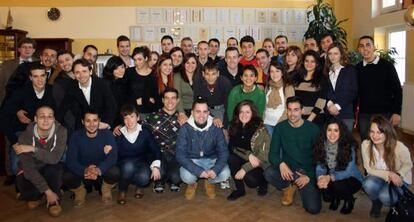“I thought the Germans were serious”
Hundreds of young Spaniards could find themselves trapped after Berlin suspends training scheme

Lidia López and Nabil Kaddaure have a lot in common. They are both Spaniards from regions where being young and unemployed pretty much go together. The two signed up to the German government’s The Job of My Life program hoping to learn both German and a profession. After spending time at a hotel/school in Rostock, the two say that they feel cheated that the German government has suspended the scheme, which provided funding for young people from hard-hit regions of Europe.
Lidia, aged 25, has almost finished the program: German language courses in Spain; more language courses in Germany, along with on-the-job training; and finally, a three-year contract to continue learning about hotel management. But she says that the German authorities have delayed her payments and refuse to give more information about the scheme, which has been suspended for this year.
Nabil, aged 21, has been in Rostock for just two weeks, and is attending German classes eight hours a day. “Things began to go wrong a couple of weeks ago when I received a letter from my language school in Malaga saying that the German government was suspending grants because there was no money. I don’t know what I’m going to do now,” she says.
This is a disaster. We were told overnight that the rules have changed”
Nabil says that she’s not only disappointed at the haste with which the German authorities have suspended the scheme, but also with her experience of it so far, describing it as a “bungle”.
“There is a group of Italians and Spaniards here who have been told that they will have funding to finish their training, but the four of us from Málaga have not been told anything, either way. And we were here before the other groups. I thought that the Germans were serious, but now I’m not so sure.”
The management at the hotel in Rostock says that the German government’s decision will affect around 200 young people from all over Europe who are training there.
However bad things get here, it can’t be worse than Spain”
Peter Pederson, the hotel-school’s manager, says that it’s not just young people from overseas who have been put out by the German government’s decision: “Hundreds of language schools around Europe that were providing classes agreed to delay payment believing that the German government would honor its commitment, but now they face the possibility of not being paid. In March, thousands of people were told that their applications were on hold, when they had already completed their language courses, and in many cases, set off for Germany.”
“This is a disaster. We were told overnight that the rules have changed,” says Christian Seefried, a volunteer who has helped young people from abroad find their feet in Rostock. The Central Placement Agency, which is overseeing The Job of My Life, says that applicants can contact it by email to find out how their application is going. Businesses can also lend a hand by helping young people to find somewhere to live,” says a spokesman for the agency.
But Nabil says that she doesn’t regret having travelled to Germany: “I’m sure that I will find work. There is a labor shortage here. A friend of mine left his CV at a company and they called him the next day. However bad things get here, it can’t be worse than Spain.”
Tu suscripción se está usando en otro dispositivo
¿Quieres añadir otro usuario a tu suscripción?
Si continúas leyendo en este dispositivo, no se podrá leer en el otro.
FlechaTu suscripción se está usando en otro dispositivo y solo puedes acceder a EL PAÍS desde un dispositivo a la vez.
Si quieres compartir tu cuenta, cambia tu suscripción a la modalidad Premium, así podrás añadir otro usuario. Cada uno accederá con su propia cuenta de email, lo que os permitirá personalizar vuestra experiencia en EL PAÍS.
¿Tienes una suscripción de empresa? Accede aquí para contratar más cuentas.
En el caso de no saber quién está usando tu cuenta, te recomendamos cambiar tu contraseña aquí.
Si decides continuar compartiendo tu cuenta, este mensaje se mostrará en tu dispositivo y en el de la otra persona que está usando tu cuenta de forma indefinida, afectando a tu experiencia de lectura. Puedes consultar aquí los términos y condiciones de la suscripción digital.









































